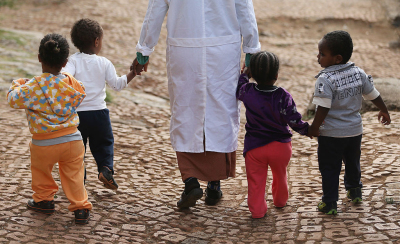
My parents began caring for orphans and vulnerable children in Eswatini in the late 1990s at the height of the HIV/AIDS epidemic. Eswatini is traditionally known for strong family units, however, extreme poverty, a lack of job opportunities, and the impact of polygamy as a culturally acceptable practice meant our country was affected more than any other in Africa when the HIV/AIDS epidemic came to the continent. The death rate was so high that for many years, it was like living in a war zone.
Eventually, my parents opened their first family-style care home for some of these children. But the needs in the community continued to be great.
Eventually, in collaboration with a group of like-minded organizations and philanthropists, they bought an old mining town called Bulembu and funded the start of Bulembu Ministries. The vision was to create a village of small, loving homes — similar to typical family units — for the many vulnerable children of Eswatini.
Everyone involved did their best, and at the time, truly believed this was the right thing for the children.
But one child opened our eyes to new possibilities for the vulnerable children of our country — and the world.
One day, social welfare asked if my father would consider looking after a young man who was currently caring for his dying mother. My dad said yes and thought he would be meeting a 17-year-old.
But the “young man” he met was only 9-years-old.
Brokenhearted, this interaction prompted my father to raise the money to purchase Bulembu and establish the community of family-like homes. Over the years, everyone at Bulembu worked hard to ensure the children were well cared for, meeting as many of their physical and emotional needs as possible. But even the best hired workers cannot replace what the children longed for most — a real family.
A child, whom I’ll call David, taught us this lesson. He changed the direction of our mission for good.
From the start, David rejected our “family-style” model. Our team worked at length to mitigate his dissatisfaction and aggressiveness with every resource we had available. But nothing changed. Eventually, we simply asked him, “How can we help you?”
With tears in his eyes, he responded, “Take me home.”
Sadly, David’s mother had died and his father was missing. Yet he knew his grandmother, though poor and elderly, was still alive.
Our team began exploring the possibility of reunification, and after utilizing resources to strengthen the grandmother’s circumstances, David went to live with her. When social workers came to check in, David was thriving. So much so, the grandmother asked if the social workers could offer their services to more families in the community.
This was a pivotal point in our work.
After decades of working and learning, we are now focused on all children in our care returning to families. We also work towards strengthening the local families, to prevent separation in the first place. With their family, in their community, is where children belong.
So yes, I grew up around many children who were called “orphans.” But quite a few of them did have family. Around the world, 80% of children living in orphanages or other residential care facilities have a living parent. They’re often called orphans, but it’s an inaccurate label.
Poverty, not lack of family, is the leading reason children are placed in orphanages.
And orphanages are no substitute for family. Research shows that children who grow up in families have the best developmental outcomes. The data is so strong that our government even asked us to partner with them to develop a national model of reunification for biological families in Eswatini.
Since shifting our efforts towards family strengthening and reunification, 42 children have been reunified with their families. We also have a church planting network, preschools, feeding programs, and 850 fields that are planted and plowed — all of which help to stabilize and support families, so parents have the resources they need to keep their family together.
We believe that the hope for Eswatini’s true transformation as a country is through the gospel and discipleship. We want children to learn to be disciples of Jesus within a loving family. Strong individual disciples will make strong families. And strong families build strong communities — which then can become a strong nation.
Taking from the Lord’s prayer, “Thy kingdom come … on earth as it is in heaven,” we will continue to work towards this kingdom transformation in the Kingdom of Eswatini, one extraordinary life at a time.
Joshua Ward is the Executive Director of Challenge Ministries U.S.















